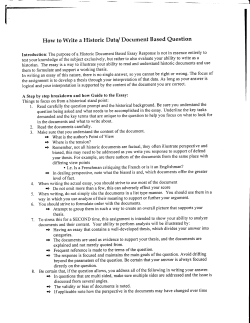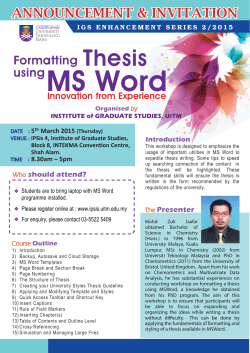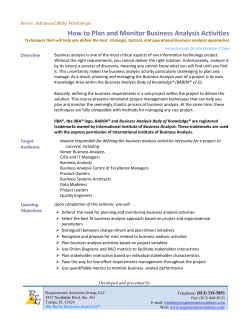
From words to action – lessons from active stakeholder participation
From words to action – lessons from active stakeholder participation in water management Frida Franzén KTH Royal Institute of Technology School of Architecture and Built Environment Department of Sustainable Development, Environmental Science and Engineering Doctoral thesis Akademisk avhandling Akademisk avhandling som med tillstånd av Kungliga Tekniska Högskolan framlägges till offentlig granskning för avläggande av filosofie doktorsexamen torsdag den 28 maj 2015 kl 14.00 i sal F3, Lindstedtsvägen 26, Kungliga Tekniska Högskolan, Stockholm Stockholm 2015 Abstract Water governance worldwide is going through a shift towards more participatory approaches. In Europe, the EU Water Framework Directive (WFD) adopted in 2000, aims at protecting surface water and groundwater. The WFD emphasizes the importance of stakeholder participation in order to reach environmental objectives. However, the empirical findings are insufficient regarding how stakeholder participation can lead to improved decisions and implemented plans. In Sweden, a major water quality problem is eutrophication caused to a large extend by diffuse nutrient leakage from agriculture. Therefore, it is important to involve farmers in water management. The overall aim of this study is to contribute the knowledge and understanding of active stakeholder participation in water management, in particular how it can lead to implementation of water quality objectives. The thesis addresses stakeholder participation in eutrophication management in local Swedish catchments, with a particular focus on farmers’ participation in the commitment of mitigation measures, particularly wetland creation. The results are based on case study research, involving four catchment areas in Sweden with severe eutrophication problems. Interviews, official documents, questionnaires and meeting observations were used to collect data. The thesis identified farm and farmer characteristics, as well as information about and economic support for wetland creation, as affecting farmers’ willingness to participation in wetland creation. In the local catchment groups studied, farmers’ emphasized other emitting actors’ responsibility and commitment in local action plans. Where this was realized, social capital within the group increased and led to further collaboration. The thesis analyzed large-scale wetland programmes at catchment scale, where the organizational and institutional arrangements were central to realize farmers’ participation: inter-municipal agreements entailed sufficient resources, the organization involved the most relevant actors; and leadership resources were important. The thesis argues that organizing water management at a catchment level can be important to cope with challenges related to stakeholder participation for mitigating diffuse nutrient leakage. In particular for dissemination and collection of information, suggesting potential measures for concerned actors, provide resources needed to realize actions, and to build trust. The thesis also emphasized that stakeholder participation has to be meaningful both for the initiators and the participants. Keywords: TRITA Stakeholder participation; EU Water Framework Directive; Eutrophication, Catchment-based water management, Agriculture LWR Phd 15:01 ISSN 1650-8602 ISBN 978-91-7595-569-8
© Copyright 2025









